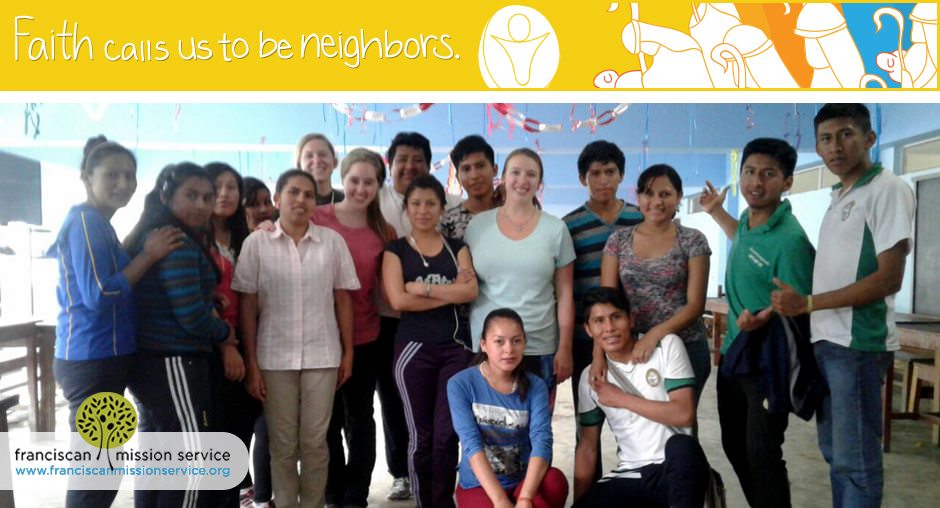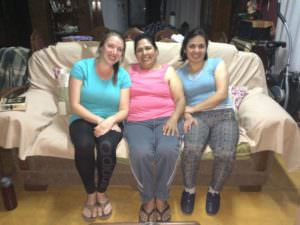Faith Calls Us to be Neighbors: Welcoming and Being Welcomed

Editor’s note: As part of FMS’ 2017 Advent blog series, missioner Aubrey Kimble recounts her experiences being welcomed in Bolivia.
This year’s Advent theme centers on hospitality and welcome, themes that are central to the Franciscan charism. I love that showing hospitality is part of the Franciscan charism because it is something that I believe is far too underrated in our society.
There is nothing like leaving your own culture behind to step foot in a new country that harshly reminds you what it feels like to be an outsider, a stranger, someone different.
My own experience in Bolivia has done that for me. My white skin and accent when speaking in Spanish make it clear that I am not from this country. I am different, and some might say that I don’t belong.
And I’m here to tell you that when someone gives you even the kindest word, or goes out of their way to help you, or invites you into their home without a second thought, that kindness hits you deep—right in the heart.
The fact that I have countless personal examples of being welcomed by Bolivians speaks volumes about their culture and how they treat outsiders in general. I never cease to be amazed by the way the students at the university here in Carmen Pampa welcome guests into their different classes and events on campus. They are always willing to share who they are and what their interests are and even ask about cultures and experiences that are different from their own.
I will also never forget the kindness that my host family, who I stayed with for only a month while in language school, showed me every single day. They were incredibly supportive of me and invited me into their daily lives and activities. They even allow me to come back from time to time and still treat me with amazing hospitality.
and activities. They even allow me to come back from time to time and still treat me with amazing hospitality.
Having these experiences abroad have made me think even more about the current situation of immigrants and refugees in my own country. They deserve to be treated with dignity and respect, but that doesn’t always happen. A verse from the gospel of Matthew also reminds me of the situation of immigrants in the United States: “Whoever receives you receives me, and whoever receives me receives the one who sent me” (Matthew 10:40).
The notes in my college study Bible regarding this verse explain, “All who receive the disciples of Jesus receive him, and God who sent him.” That’s a pretty clear lesson: whenever we “receive” someone, or at least in my interpretation, show hospitality or welcome someone we don’t know, we are showing the same attitude to God. If I believe that, then the reverse must also be true: whomever I don’t receive or don’t welcome, I am doing so to God.
Richard Rohr’s book, The Divine Dance, also includes an interesting passage about welcoming. On page 164 Rohr, who is a Franciscan friar, says:
“It always surprises people that there are very few sayings or stories found uniformly in all four gospels, Matthew, Mark, Luke, and John; there really aren’t that many. This is one: Anyone who welcomes you welcomes me; and anyone who welcomes me welcomes the one who sent me […] have you ever stopped to think what’s really happening here? Jesus is saying there is a moral equivalence between you, your neighbor, the Christ, and God!”
Here, Rohr is talking more about the Trinity and our relationship to and understanding of it, but I also think it applies to the reflections in this blog post. How amazing is it that this verse about welcoming is one of the very few verses that are repeated in all four gospels? It must be a pretty big deal!
I also really like how Rohr talks about moral equivalence. Really and truly, what you do to your neighbor, you do to God and to yourself, in a roundabout way.
In light of this, I will certainly be paying more attention to those who are yearning to be welcomed and shown hospitality now that I have returned home.
Reflection question: In what ways can you challenge yourself to “receive” others, thus welcoming the Christ inside them?
Tagged in:

